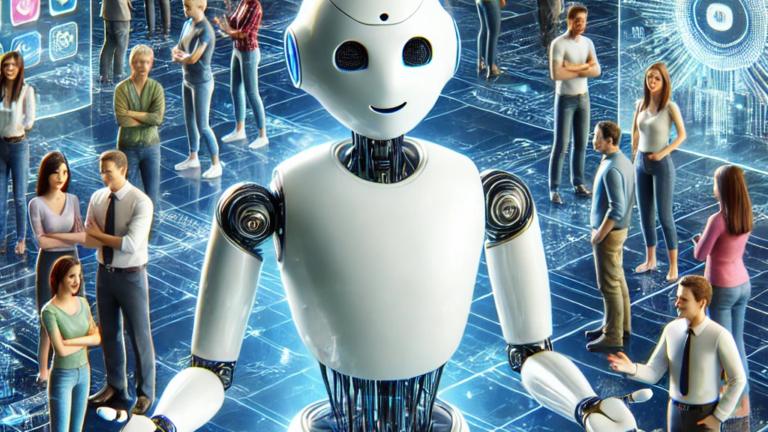Exploring the Next Generation of AI-Powered Interactions and Their Impact on Daily Life
Artificial Intelligence (AI) continues to transform our daily lives, with chatbots being at the forefront of this evolution. As we approach 2025 and beyond, AI chatbots and smart agents are set to become even more sophisticated, personalizing our experiences, exhibiting emotional intelligence, and improved independent decision-making. These advancements will make our interactions with this technology more seamless, intuitive, and impactful. Here are some exciting trends to watch in the future of AI chatbots.
Personalization with AI
AI chatbots will leverage increasing sophisticated algorithms delivering personalized experiences based on our past interactions. They will analyze vast amounts of data to understand our preferences, our behaviors, and our needs to offering tailor-made solutions and recommendations.
Personalization will manifest itself in so many ways. We will encounter it in personalized search results that consider our browsing history and past searches, making it easier to find exactly what we’re looking for. And we’ll find it in product recommendations that become even more precise, suggesting options better aligned with our tastes, budget, and prior purchases.
Chatbots will also assist in planning unique itineraries for travel, recommend restaurants based on our culinary interests, and even curate the news we read so that it reflects our interests. The result will be more engaging and seamless experiences that feel uniquely crafted for each of us.
Emotional Intelligence
Chatbots will become even better at recognizing and responding to our emotions. They will use advanced sentiment analysis to detect subtle changes in our tone and in our mood. This will allow them to engage more empathetically and effectively with us.
Customer service chatbots will be able to identify when we are frustrated or upset and respond with a calm and empathetic tone. They will be more likely to offer solutions that address our concerns promptly. In healthcare applications, chatbots will provide supportive interactions, offering encouragement and resources to those in need. Chatbots in educational settings will adapt their teaching methods based on students’ emotional states, ensuring a more supportive and effective learning environment.
By recognizing and responding to our emotions, chatbots will foster more human-like interactions, enhancing our overall satisfaction and increasing trust with them.
AI-Driven Insights and Analytics
Future chatbots will not only interact with us but also provide valuable insights and analytics to the companies that deploy them. Businesses with chatbots will be able to gather interaction data and derive actionable insights, helping them better understand our, their customer needs in order to improve their product and service offerings.
Insights will come from analyzing patterns in our queries, feedback, and actions. For example, analytics will enable business to identify frequently asked questions and common complaints, enabling them to identify areas where their products or services need improvement. Chatbots will track our sentiment over time, allowing businesses to gauge the effectiveness of new initiatives or changes. They will also help in market research by identifying emerging trends and preferences, enabling businesses to stay ahead of the competition.
Beyond customer service, chatbots will facilitate internal analytics, assisting in workforce management identifying training needs, monitoring employee engagement, and optimizing business operations. Overall, data-driven insights from chatbots will empower businesses to make better decisions to guide their overall customer engagement strategy.
Independent Decision-Making
As AI technology advances, chatbots will gain more autonomy in decision-making. They will handle more complex tasks without our intervention, making them invaluable in customer service, healthcare, finance, and other industries where quick, accurate decisions are crucial.
Chatbots will resolve issues independently. As they become trusted within the business to make autonomous decisions, they’ll be able to process refunds, manage account settings, and troubleshoot technical problems.
In healthcare, chatbots will assist with patient triage, provide medical advice based on symptoms, and monitor chronic conditions. They’ll be able to alert healthcare providers to any concerns.
Financial institutions will benefit from chatbots that can manage routine transactions, detect fraudulent activities, and provide personalized financial advice based in real-time based on data analytics.
And in industries like logistics, we will see chatbots that can optimize supply chain operations, scheduling deliveries, and managing inventory with a minimum of human oversight.
By automating complex tasks while empowering chatbots with additional decision-making authority, we will see enhanced effectiveness allowing their us to focus on high-level and high-value strategic initiatives. This will drive innovation and growth across a wide range of industries.
Multimodal Interaction
Chatbots will support multimodal interactions, allowing users to communicate through text, voice, gestures, and even facial expressions. This will make interactions more natural and intuitive, enhancing user experience across different devices and platforms.
In smart home environments, we will be able to control our devices using a combination of voice commands, gestures, and touch inputs. This will create a seamless and interactive experience for with our homes and offices.
In customer service, chatbots will engage with us through video chats. They will be able to analyze our facial expressions to better understand our emotions and respond appropriately.
In educational settings, students will interact with chatbots using voice and gestures, making learning more interactive and engaging.
Chatbots found in virtual and augmented reality environments will use a blend of these modalities to provide immersive and responsive experiences. This will take gaming, training, or virtual meetings to a whole new level.
By supporting multimodal interactions, chatbots and smart agents will become more accessible and friendly.
Blockchain Integration for Enhanced Security
Blockchain technology will be increasingly integrated with chatbots to enhance security and transparency. This will ensure secure transactions and data exchanges, building greater trust among users and businesses.
By leveraging blockchain, AI chatbots will provide immutable records of our interactions, ensuring that all communications and transactions are transparent and verifiable. This will be particularly beneficial in finance and healthcare, where data integrity and security are paramount.
For example, in financial services, chatbots will facilitate secure transactions, process payments, and manage contracts with blockchain-backed authenticity, reducing the risk of fraud. And, in healthcare, patient data managed by chatbots will be securely stored and shared on the blockchain, ensuring that only authorized parties have access, and that the data cannot be tampered with.
Additionally, blockchain will enhance the traceability for supply chains that are managed by chatbots. This will provide real-time visibility into the movement of products, ensuring compliance with regulations.
Overall, the integration of blockchain technology will elevate both the trustworthiness and the reliability of chatbot interactions, thus increasing our confidence and paving the way for broader adoption across a wide swath of industries.
Sophisticated Virtual Assistants
Virtual assistants powered by advanced AI will become more sophisticated, capable of managing complex schedules, coordinating multiple tasks, and integrating seamlessly with various smart devices. They will function as central hubs for managing personal and professional lives.
Imagine a virtual assistant that not only reminds us of upcoming meetings and appointments but also coordinates with our smart home devices to ensure everything is ready for our day. Smart virtual assistants could start the coffee maker in the morning, adjust the thermostat in our home, and manage our grocery list by checking the contents of our smart refrigerators.
In professional settings, these assistants will oversee scheduling our meetings, sending out reminders, and organizing priorities and tasks across different projects all the while making sure nothing falls through the cracks. They will integrate with our email and messaging apps providing updates and reminders in real-time, keeping us on top of our communications.
Furthermore, these virtual assistants will learn our habits and preferences over time. They will personalize our experience by offering suggestions and automating routine tasks to make our lives easier. These advanced AI virtual assistants will streamline our daily routines, enhance our productivity, and enable an optimized lifestyle that focuses on what we think is important.
Proactive Assistance
Future chatbots will shift from reactive to proactive assistance. They will anticipate our needs and offer solutions without being asked. For instance, a chatbot might remind you of an upcoming appointment or suggest relevant products based on your browsing history. These proactive chatbots will use advanced algorithms to predict what our next needs might be.
If we frequently order groceries online, our chatbot could remind us when it’s time to restock the frig and pantry. It could even suggest novel recipes based on what we already have.
At work, the chatbot will recognize patterns in our schedules and suggest the best times for meetings and breaks. It will help us manage deadlines and proactively remind us to complete tasks or follow up on emails.
Also, if we’re planning a trip, our smart assistants will provide weather updates, suggest activities based on our interests, and even check you in for our flights.
By anticipating our needs and offering timely assistance, proactive chatbots will save us time and effort, making our daily routines smoother and more enjoyable.
Enhanced Collaboration with Humans
AI chatbots will work more collaboratively with us, serving as co-pilots in many different tasks. In the workplace, they will assist us by automating routine tasks, provide insights, and enhance our productivity. Human-AI collaboration will become the standard in many industries.
In the office, chatbots will handle those mundane tasks such as scheduling meetings, managing emails, and generating reports. This will free us up to focus on more strategic and creative work. They will analyze our data and provide actionable insights, helping us make better decisions more quickly.
For example, marketing teams will use chatbots to analyze campaign performance in real-time, identifying which strategies are working and which need adjusting. In customer service, chatbots will assist human agents handling the common inquiries, passing to live agents only the more complex issues that require a personal touch.
Additionally, chatbots will play vital roles training and onboarding new employees. They will offer guidance and answer questions as new employees learn their roles. In industries like manufacturing and logistics, chatbots will monitor systems and processes, providing real-time updates and alert us disruptions.
By working alongside us, chatbots will complement, augment and enhance the skills and abilities we already have, thus creating more dynamic workplaces. The human-chatbot collaboration will increase productivity, improve job satisfaction, and open avenues for greater innovation because we will be able to devote more time to complex tasks and high-value objectives.
Environmental Sustainability
AI chatbots will contribute to environmental sustainability by optimizing resource use and reducing waste. They will help businesses establish and implement eco-friendly practices and provide us with information on sustainable choices, aligning with the global push for a greener future.
In business, chatbots will analyze operations suggesting ways that reduce energy consumption and minimize waste. For example, in manufacturing, chatbots will monitor production processes and identify inefficiencies. They will help with optimizing the use of staffing, materials, and energy. In retail, these smart and intelligent chatbot will manage inventory more effectively, reducing overstock and minimizing waste. Additionally, chatbots will assist in logistics planning determining delivery routes, lowering fuel consumption and emissions.
On the consumer side, chatbots will provide personalized recommendations for eco-friendly products. They will suggest energy-saving tips for our homes. They will recommend sustainable products based on our interests and habits while tracking our carbon footprint. In travel, they will suggest greener transportation options and eco-friendly accommodations.
Furthermore, chatbots will support educational initiatives, raising awareness about environmental issues and promoting sustainable behaviors. They will answer questions about recycling, provide information on local environmental policies, and encourage participation in community-based sustainability programs.
By helping both businesses and consumers make more informed and sustainable choices, AI chatbots will play a crucial role in helping us foster a greener and more sustainable future.
Ethical AI and Bias Mitigation
The focus on ethical AI will intensify, with more robust measures to mitigate biases and ensure fairness in AI interactions. Transparency and accountability in chatbot design and deployment is critical to fostering trust and reliability in all things AI.
Companies will prioritize creating AI chatbots that operate without bias, ensuring that all of us receive fair and equal treatment when engaging with AI. This will involve rigorous testing and validation to identify and eliminate biases in artificial intelligent algorithms. For example, chatbots used in hiring processes will be designed to evaluate candidates based on merit alone, while avoiding any form of discrimination based on gender, ethnicity, or other personal characteristics.
Companies will openly communicate how their artificial intelligent chatbots are programmed, what data is collected, and how it is used. We will be better informed about chatbot decision-making, including the rationale behind any recommendations and responses. This openness will help us feel more comfortable and confident in our interactions with these applications.
Accountability measures will ensure that chatbots operate responsibly and ethically. Citizens, industry, and governments will establish guidelines and standards for AI development and use. They will regularly audit systems to ensure compliance. Additionally, there will be mechanisms for us to report issues or concerns with our interactions so that any problems are addressed promptly.
By focusing on ethical AI, developers and the companies they work for will create intelligent systems that not only perform capably but also uphold principles of fairness and integrity. This commitment to ethics will enhance the credibility of AI technologies and foster a more inclusive and equitable digital landscape.
Final Thoughts
Looking towards 2025 and beyond, AI chatbots will continue to evolve, becoming more intelligent, intuitive, and integrated into our daily lives. These trends highlight a future where chatbots are no longer passive tools but proactive, empathetic, and highly personalized assistants that enhance our experiences in various ways. They will provide personalized interactions, recognize, and respond to our emotions, and offer valuable insights that drive better decisions personally and in business.
As these smart agents are allowed to take action independently and in collaboration with us, they will transform the way we work, live, and interact with technology. Their contribution to environmental sustainability and ethical standards will help create a greener and more equitable digital landscape. The potential for AI chatbots is vast, and the coming years will undoubtedly bring even more exciting advancements, making our lives richer and more connected. The future of AI chatbots promises to be one where technology not only serves us but also evolves with us, creating a truly transformative impact.
How will you leverage the power of AI chatbots to transform your business and daily life? Embrace these advancements to create more personalized, efficient, and engaging experiences for your customers. When you start integrating AI chatbots today you will become part of an innovative future. What steps are you taking to harness the potential AI chatbots and smart assistants in your business?
#AIChatbots #FutureTech #AI2025 #TechTrends #SmartAssistants
About the Author
Stephen Howell is a multifaceted expert with a wealth of experience in technology, business management, and development. He is the innovative mind behind the cutting-edge AI powered Kognetiks Chatbot for WordPress plugin. Utilizing the robust capabilities of OpenAI’s API, this conversational chatbot can dramatically enhance your website’s user engagement. Visit Kognetiks Chatbot for WordPress to explore how to elevate your visitors’ experience, and stay connected with his latest advancements and offerings in the WordPress community.



Leave a Reply
You must be logged in to post a comment.